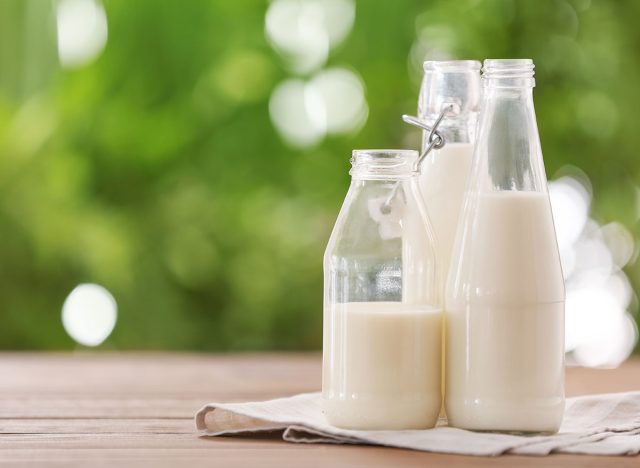The Worst Drinking Habits for Memory Loss, Says Dietitian

Several studies over the past several decades have proven that there are diet and lifestyle changes that you can adopt to keep your mind sharp as you age. Most studies have focused on the benefits of a plant-based diet with plenty of colorful fruits and veggies and limited intake of added sugars, saturated fat, and processed foods to keep your mind sharp.
As a result, you may be enjoying more berries, salmon, and kale because you heard it's important for your brain, but what you drink can also impact memory loss. The right sips can help with concentration, cognition maintaining your short- and long-term memory as you age.
Read on to find out the worst drinking habits for memory loss. Read on, and for more on how to eat healthy, don't miss The #1 Best Juice to Drive Every Day, Says Science.
Drinking too much soda and sugary beverages

If there's one type of beverage you want to limit to help keep your brain sharp, it's sugary sips like soda, fruit drinks, energy drinks, and sweetened sparkling waters. Sugary beverages increase your risk of becoming overweight or obese, experiencing high blood sugar levels, and developing heart disease, which are all linked to an increased risk of Alzheimer's disease and other types of dementia.
What's more, one study published in The Journal of Prevention of Alzheimer's Disease reported that among individuals who reported drinking one to seven servings of sugar-sweetened beverages per week were 1.91 times more likely to develop Alzheimer's disease than those who consumed no sugar-sweetened beverages. In addition, those who consumed more than seven sugar-rich beverages per week were 2.55 times more likely to develop Alzheimer's disease.
Binge drinking

Avoiding binge drinking or enjoying more than about a drink per day for most adults is one of the worst habits to manage mild cognitive declines and dementia. According to reams of published research and the Alzheimer's Society, alcohol consumption in excess has well-documented negative effects on both short- and long-term memory.
According to scientists, excessive alcohol increases the risk for high blood pressure, diabetes, stroke, atrial fibrillation, and heart failure, which in turn can increase vascular dementia. Studies show that excessive drinking can shrink the white matter of the brain. One study published in Lancet Public Health reported that heavy alcohol consumption tripled the risk of early-onset dementia. Bottom line: If you drink alcohol, do so in moderation and follow the public health guidelines for alcohol consumption.
READ MORE: The #1 Worst Drink for Memory Loss, Says Science
Drinking caffeinated beverages late in the day

Poor or insufficient sleep is associated with increased risk for Alzheimer's disease, as well as learning and cognitive impairments. A good night's sleep helps the brain process and store memories and new information.
Public health organizations suggest that sleep deprivation and poor sleep increase the risk for mental health problems and declines in memory. What you drink in the afternoon and evening can make it harder for you to have restful sleep. Avoiding caffeinated beverages, like tea, colas, energy drinks in the late afternoon or evening is a good way to help ensure that what you drink doesn't negatively impact your ability to get a good night's sleep. Alcohol should also be avoided because it is also known to help you fall asleep, but it disrupts sleep the second half of your total sleep time. For this reason, most health organizations advise individuals to avoid alcohol to improve overall sleep quality.
Bottom line: Limit caffeinated beverages and strive to get seven to nine hours of sleep as much as possible.
Always opting for full-fat

If you enjoy your coffee daily with half & half, coconut milk, or full-fat milk; milkshakes are your favorite treat; and/or your post-workout smoothie is made with coconut milk, you may be increasing your risk for dementia. This is because foods rich in saturated fat are one of the worst choices for the blood vessels to your brain. Since many types of dementia is considered "vascular," the health of your blood vessels is the most important thing to focus on to keep your brain healthy. Bottom line: Avoid drinking too many beverages rich in saturated fat, like full-fat milk, coconut milk, cream, and other full-fat dairy-based beverages, like milkshakes.








